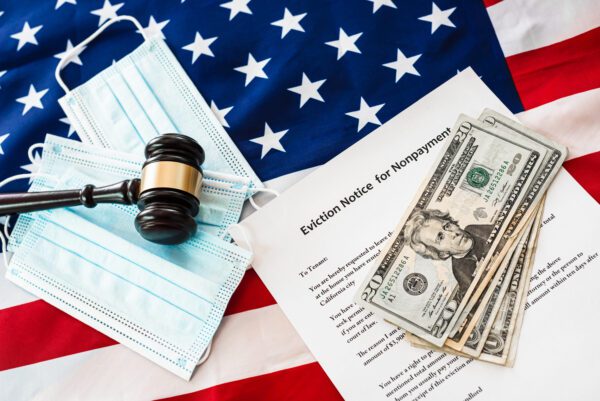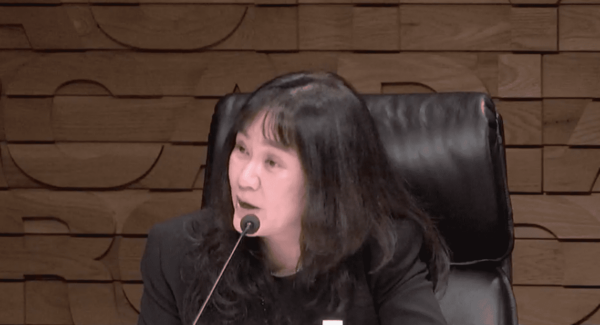By ERIC HE
A slate of permanent tenant protections are set to come before the Los Angeles City Council later this week after the council’s housing committee voted to move forward with recommendations Wednesday.
The council is under pressure to implement protections before the state of emergency due to COVID-19 expires at the end of the month, which also sunsets the temporary protections that have been in place since the start of the pandemic.
The council has voted twice to end the state of emergency at the end of the month, with two amendments seeking to extend it failing — the most recent attempt by one vote.
The committee on Wednesday recommended approval of three key protections tenant advocates have called for — universal just cause to require a reason for evictions, relocation assistance if a tenant cannot pay rent increases of more than 10% and a one-month grace period for rent before evictions.
The full City Council is expected to vote on the items Friday.
Tenant groups fear a wave of evictions once the long-standing protections expire. The volume of eviction filings has begun to resemble prepandemic levels, according to Kyle Nelson, a postdoctoral fellow at UCLA and a member of the LA Renters’ Right to Counsel Coalition.
Nelson, who has compiled data on evictions in Los Angeles County during the pandemic through court filings, said the number of filings could increase to levels not seen since the Great Recession — which contributed to more than 72,000 eviction filings in 2008. According to the National Equity Atlas, there are 226,000 households in Los Angeles County who are behind on rent.
Just cause protections currently do not apply to apartment buildings built after 1978. If adopted by the full council, approximately 396,000 more rental units would be protected.
The committee, on a 3-2 vote, sought for just cause protections to kick in upon the expiration of the lease or after 12 months, whichever comes first. The draft ordinance had called for immediate protections, but three members had concerns over unintended consequences on short-term leases.
Councilman Bob Blumenfield proposed the amendment, which Councilwoman Nithya Raman said she was uncomfortable with because she didn’t have data on the potential ramifications.
“Moving forward, I hope that we’re not making decisions in this way, without time to have the Housing Department report back on what the implications are going to be on tenants,” said Raman, chair of the committee.
Blumenfield responded that he also had concerns over the uncertainty of implementing just cause immediately. The committee ultimately took the vote, given the looming expiration of temporary tenant protections.
The committee also voted 4-1 to recommend protections against rent increases and assistance on payment of rental arrears.
Under the recommendations, if a landlord increases rent by more than 10% or the Consumer Price Index plus 5%, they must pay the tenant three times the fair market rent for relocation assistance, plus $1,411 in moving costs.
According to the city’s housing department, fair market rent for a one-bedroom apartment in Los Angeles is $1,747 and $2,222 for a two-bedroom. This would protect an additional 84,000 rental units in Los Angeles that were built after 2008.
The third proposed protection would allow tenants behind on rent to stay in their apartments for a month, unless they owe more than one month’s worth of fair market rent.
The council voted 12-0 in October to approve a package of recommendations from a council committee to sunset the renter protections.
Under the council action, landlords will be able to resume increasing rent on rent-controlled apartments, which account for three-quarters of the units in Los Angeles, beginning in February 2024.
Tenants who have missed payments since March 2020 will have to meet two repayment deadlines. Under state law, they have until Aug. 1, 2023, to pay back missed rent between March 1, 2020, and Sept. 30, 2021. Under the city’s moratorium, tenants will have until Feb. 1, 2024, to repay rent accumulated from Oct. 1, 2021, to Feb. 1, 2023.
Prior to voting, the committee heard from tenants and landlords about the recommendations.
Bijan Ghaemi, with Community Power Collective, said passing the protections was the “very least the city can do” to assist vulnerable tenants.
“Without the extension or passing of these protections, tenants stand to lose much, much more than landlords, small or corporate,” Ghaemi said. “Many stand to lose their lives and risk their physical and mental health.”
Fred Sutton, senior vice president of local public affairs for the California Apartment Association of Los Angeles, called the additional tenant protections unnecessary and susceptible to confusion. He claimed that the length of the pandemic-era tenant protections will make housing harder to find and more expensive — because landlords have not been able to raise rent to keep up with the rise in inflation.
“It is just to be compensated for your work, labor and time,” Sutton said. “The fabric of a trusting and reliable economy depends on the expectation that you are paid for services performed. The proposal is picking an arbitrary threshold, which will ultimately hurt those that it intends to help.”
Sasha Harnden, public policy advocate with Inner City Law, told the committee that tenant protections have been “life-saving” during the pandemic and helped to ensure an equitable economic recovery.
“We simply don’t have time to go round and round,” Harnden said. “These issues have been vetted, have been carefully considered and now it is time to pass tenant protections.”







